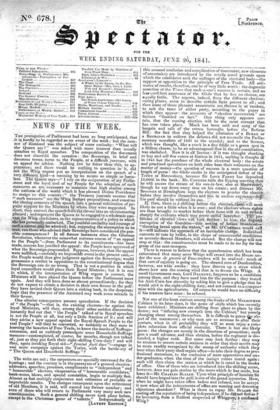NEWS OF THE WEEK.
'Tras Pror:ogation of Parliament had been so long anticipated, that ..it is, hardly to. be,regarded as an event of the week ; but the man- ner of dismissal .was, the subject of some curiosity: "What will the Queen say ? " was asked with more interest than usually attaches to Royal speeches. The composition of the document does not discredit the occasion : the Sovereign, in brief and decorous terms, turns to the People, at a diffienit juncture, with 'an appeal for advice. Nothing can be' fairer' thank this, to ap- pearance; and there would be nothing to question in it, did not the Whig organs put an interpretation on the speech of a very different meaning by no means so simple'or harm- less. The Queen' says—" I rely on the cooperation of my.Parlia- anent and the loyal, zeal of my People for the adoption,of such -measures as are necessary to maintain that high station: among .the- nations' of the Aroild which it has pleased Divine PrOvidenee to assign-to- this country :" the Treasury journals assume that -" such measures" are the Whig Buidget propositiOns,,and-construe the closing sentence of the speed) into a general dolicitation of pi'. pular support fol• the Ministers by whom they were suggested. In short, they convert the speech from the throne into an electioneering placard; • and represent the Queen to be engaged in a,wholesale can- vass for 'Whig Andidates, as the rePresentatives'of a policy in which she has personally embarked. The youthful cordiality and courage of such a course may be admired; but, supposing the assumption to be true, can those who advised their Sovereign have considered the pos- sible consequences ? In all former instances since the Glorious Revolution, whenever the somewhat extreme course of "an appeal to the People "—from Parliament to its constituents—has been made, success has justified the appeal: the People have approved of what the Sovereign propounded. Suppose, however, that the appeal were nullified,—certainly no impossiblt event in the present case,— the People would thus give judgment against the Sovereign; would pronounce a verdict in opposition to the constitutional dogma that the Sovereign can do no wrong. That is not a position in which loyal counsellors would place their Royal Mistress; but it is one in which, if the interpretation of Whig organs is correct, the Ministers will have placed the Queen before the Parliament meet again. And they will have done so almost premeditately ; for they do not expect to obtain a decision in their own favour at the poll : they have invited their Queen into a sinking bark, in the desperate hope that the presence of the Anointed may work some miracle in their favour.
One ulterior consequence amuses speculation. If the decision of "the People "—that is, the existing electors—be against the loyal Ministers, will they, among their other sudden discoveries, instantly find out that "the People" talked of in Royal speeches is not the People at all, but only a little fraction of it ; and will they advise a new appeal against the Royal-Speech People to the real People ? will they be converted, as suddenly as they were in learning the beauties of Free Trade, to know the merits of Suffrage- extension, and as suddenly promulgate some Household-Suffrage measure—contemplated, of course, for months, though not talked of; just as they put forth their eight-shilling Corn-duty ? and will they, again invoking Royal aid—"fmmind facti duce "—engage in one more campaign against the Tories, with the battle-cry of "The Queen and Household Suffrage " ?


























